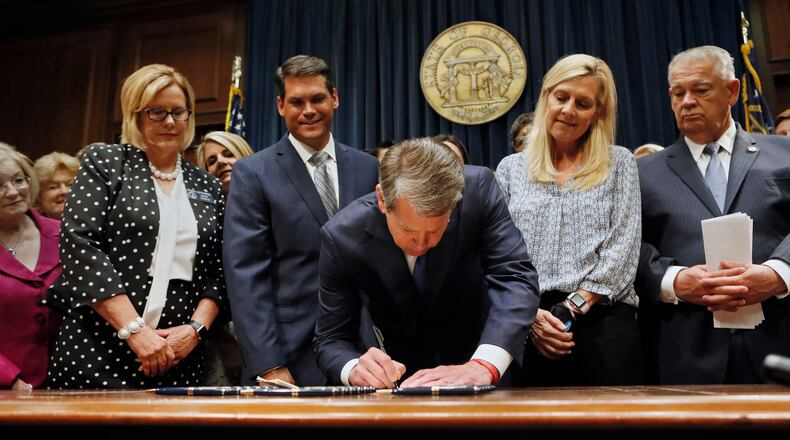On Tuesday, before he put his signature on House Bill 481, Gov. Brian Kemp uttered one sentence with which the women protesting outside the state Capitol could agree.
“Remember, today is just the beginning, folks,” Kemp said.
He’s right. Several things now take flight. Specifically, the governor was alluding to the next items on the religious conservative to-do list, from changes to the state foster care system to sex trafficking.
But Kemp had already acknowledged that his signing of the anti-abortion “heartbeat” bill — now the “heartbeat” law — would also tee up an intense courtroom battle over the constitutionality of a measure that now bans most abortions after six weeks. That’s before many women know they're pregnant.
But more than the beginning of a legal fight, the signing of HB 481 is the starting pistol for a new phase in this state’s never-ending culture war — a phase that, for the first time, could put the GOP in jeopardy. Even and especially in north metro Atlanta, the birthplace of Georgia Republicanism.
Abortion rights groups vow payback as Kemp preps to sign ‘heartbeat’ bill
Women voters will be both the battleground and the warriors. College-educated women, in particular. Kemp and other male Republican leaders in the Capitol understand this.
On Tuesday, organizers made sure that plenty of women were in the camera frame with the governor. The HB 481 signing ceremony featured state Sen. Renee Unterman of Buford, who carried the bill in her chamber. She is one of two Republican women in the state Senate. The other, Kay Kirkpatrick of Marietta, didn’t support the legislation.
Abortion won’t be the only issue in the coming culture war. LGBT rights is another. And guns.
Last week, the National Rifle Association sacked its president, Oliver North, and installed Carolyn Meadows, a longtime NRA and Republican activist who lives in east Cobb County. Within the Sixth Congressional District.
In a weekend interview with the Marietta Daily Journal, Meadows told the newspaper that one of her top priorities would be the defeat of U.S. Rep. Lucy McBath, a Democrat who became a spokeswoman for an anti-gun violence group after her son was murdered.
Last November, McBath defeated incumbent Karen Handel, an NRA-endorsed Republican. In the MDJ interview, Meadows said that McBath won because she was an African-American woman.
Meadows apologized for that remark on Monday. But her explanation was more revealing still. "I did not intend to discredit the congresswoman or the merits of her campaign — only to reflect my view that the Second Amendment was not a prevailing factor in this election," Meadows told the Washington Post.
It was a tacit admission that, if the 2020 race for the Sixth District becomes centered on gun policy, the Republican cause is as good as lost.
House District 79 is wholly contained within the Sixth, anchored by the city of Dunwoody. For decades, it has been reliably Republican. Last November, the seat was won by attorney Mike Wilensky, a Democrat.
In the months leading up to the election, pollsters working for Wilensky researched the campaign messages their candidate might carry into battle. They found two that resonated among voters more than education, more than the HOPE scholarship, and more than health care.
One was this: “Georgia can’t attract Amazon and other businesses if it keeps proposing new laws that legalize discrimination on the basis of race, religion, gender or sexual orientation.”
The other was this: “After Parkland, it’s important that Georgians come together and pass reasonable gun safety measures like background checks, banning bump stocks and preventing people with a history of domestic violence from acquiring guns.”
Leaning on those two messages, Wilensky won in a historically GOP district with 54 percent of the vote.
You and I are witnesses to a reshaping of Georgia politics, not just along demographic lines, but along educational lines, too. White voters with no college education are staying Republican. White, college-educated voters are moving to the Democratic column. Even the wealthy ones.
Patrick Egan is an associate professor in New York University’s Department of Politics. He ran the numbers on the 46 congressional seats that changed party hands in 2018. The two Republican pick-ups were both in rural Minnesota. In each case, college-educated voters numbered less than 30%.
Democrats had a net gain of 40 seats in the U.S. House. In one aspect, the Sixth District stood out from them all. “In terms of the percent of voting-aged adults who have a four-year college degree, the Georgia Sixth is right at the top,” Egan said. More than 60 percent have four-year degrees. The only other that came close was Virginia’s 10th District, with more than 50 percent.
Social issues, plus President Donald Trump’s rhetoric on immigration and other topics, are driving the shift. “These are all things that have really pushed well-educated voters toward the Democratic party, and I think we’ve especially seen this among women,” Egan said. “That’s how a Democrat wins in a district that is still majority white and relatively wealthy.”
Democrats may have to adjust to the newcomers.
“Those white voters who are well-educated and well-off may not be as interested in the economic populism that you’re hearing from some parts of the Democratic party,” Egan said. Like U.S. Sen. Bernie Sanders of Vermont or U.S. Rep. Alexandria Ocasio-Cortez of New York.
But it might be fertile ground for the likes of former Vice President Joe Biden.
Statistics can mislead. So it’s always worthwhile to pay attention to what a politician does, to see if her actions line up with the numbers.
Last Saturday, U.S. Rep. Lucy McBath, D-Marietta, spoke at an annual Atlanta gathering of the Human Rights Campaign, an LGBT-rights group. The woman who represents a congressional district that was once the power base for Newt Gingrich spoke of her fight with the NRA before a rapt audience of gays and lesbians.
The video is on YouTube. McBath didn't seem the least bit worried.
About the Author
The Latest
Featured




